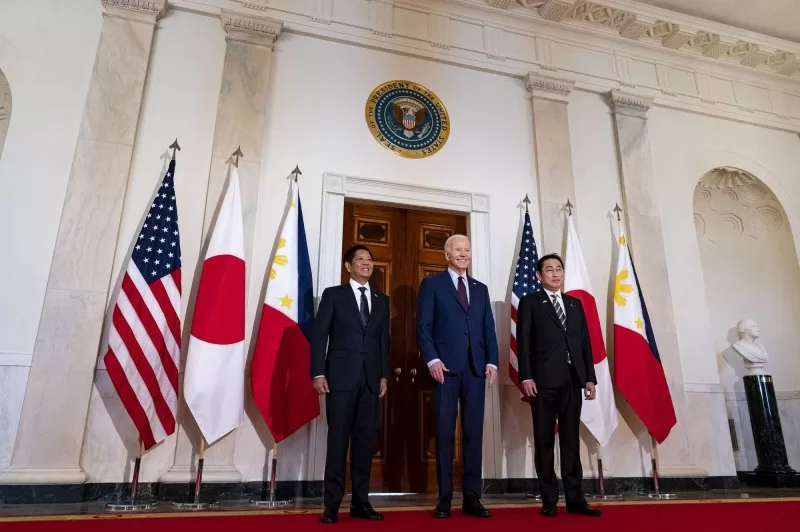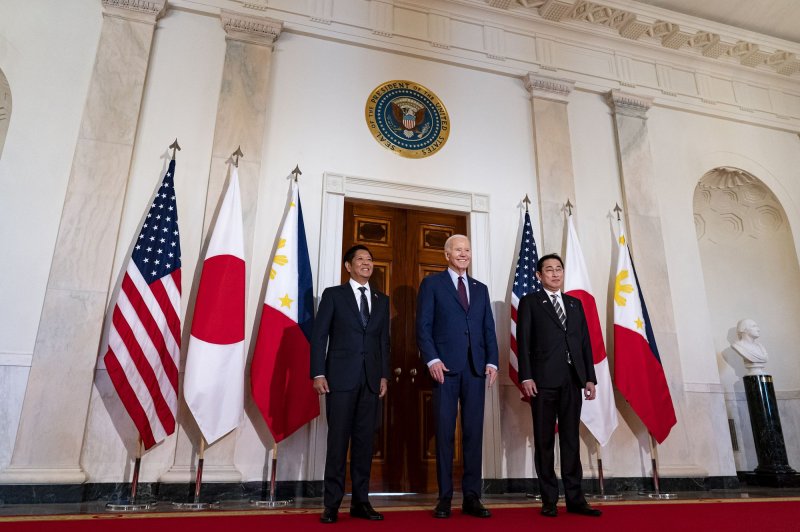1 of 4 | President Joe Biden stands with Philippines President Ferdinand Marcos Jr., left, and Japanese Prime Minister Fumio Kishida during a trilateral meeting in the East Room of the White House. Biden unveiled joint military patrols and training with the Philippines and Japan as the allies seek to counter an increasingly assertive China in the South China Sea. Photo by Al Drago/UPI |
License PhotoApril 11 (UPI) — President Joe Biden on Thursday hosted the first-ever trilateral summit with Japanese Prime Minister Fumio Kishida and Philippines President Ferdinand Marcos Jr., to strengthen alliances in the Indo-Pacific.
Biden said during the meeting the United States’ commitment to Japan and the Philippines remains “ironclad” amid China’s assertion of power in the South China Sea.
“When we stand as one, we’re able to forge a better future for all,” Biden said
The three leaders in a joint statement established commitments to partner on issues such as clean energy, infrastructure, emerging technologies, and maritime security.
The joint statement also announced the launch of the Luzon Economic Corridor, which they said will promote connectivity between Subic Bay, Clark, Manila, and Batangas in the Philippines.
Through this corridor, the three countries aim to accelerate “coordinated investments in high-impact infrastructure projects” at Subic Bay such as rail, port modernization, clean agribusiness, and civilian port upgrades.
Secretary of State Antony Blinken assured the Philippines in March of the Biden administration’s “ironclad” commitment.
That prompted a response from China that said the United States is not a party to the conflict in the South China Sea and has no right “to interfere in the maritime issues between China and the Philippines.”
Senior administration officials said the trilateral summit is part of Biden’s prioritization of reinvigorating the U.S. network of alliances and partnerships around the world.
The summit bolsters what National Security Advisor Jake Sullivan has called an “overlapping latticework” of mutually reinforcing partnerships in the Indo-Pacific.
The White House made it quite clear that the U.S.-Philippines mutual defense treaty applies to the South China Sea and includes the Philippines’ coast guard and other vessels there.
Nick Szechenyi, of the Center for Strategic and International Studies think tank, told The Hill that the trilateral summit “is meant to initiate sort of a new chapter” between the three countries, with a focus on maritime security “to demonstrate to China that the U.S. and its allies will continue to resist attempts at coercion.”
In addition to security guarantees and military cooperation, the summit also will deal with important new infrastructure projects known as the PGI Luzon corridor.
According to the State Department, PGI corridors focus on geographically connected areas with integrated investments “in transportation, clean energy supply chains information and communications technology, agricultural systems, or health and health security leverage broader and more transformative effects, with the aim of significantly boosting economic development opportunities.”
The first-ever PGI corridor in the Indo-Pacific will connect Subic Bay, Clark, Manilla, and Batangas in the Philippines to accelerate coordinated investments in ports, rail, clean energy, semiconductors, and supply chains.
Defense and security ties continue to serve as the cornerstone of the alliance with Japan and the Philippines, senior administration officials said.
They said the trilateral summit is a clear demonstration of support and a message that the United States and Japan stand “shoulder to shoulder” with the Philippines.
That support includes four new sites under the Enhanced Cooperation Defense Agreement providing an additional $100 million in foreign military financing for the Philippines.
In addition to the trilateral defense cooperation, Japan, Australia, and the United States are working on a coordinated network of radars and sensors to better integrate ballistic and air defense capabilities in the Indo-Pacific.
Marcos is also coming under pressure from what senior administration officials called China’s aggressive tactics in the Philippines’ exclusive economic zone.
The United States, Japan, and the Philippines continue to closely coordinate what senior administration officials called the question of “China’s so-called gray zone tactics, its coercive tactics, and what the implications of those might be.”

